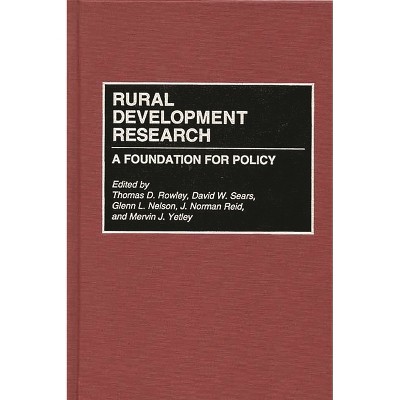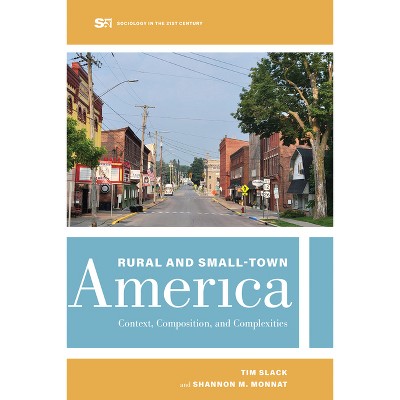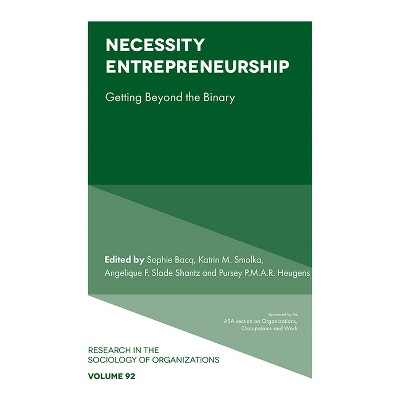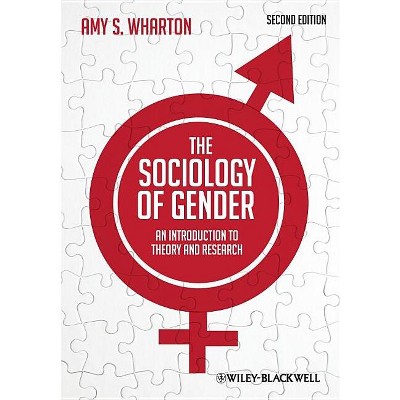Sponsored

Diffusion Research in Rural Sociology - (Controversies in Science) by Frederick C Fliegel (Hardcover)
In Stock
Sponsored
About this item
Highlights
- Fliegel overviews and summarizes research on the spread of innovations through rural populations.
- About the Author: FREDERICK C. FLIEGEL was Professor of Rural Sociology at the University of Illinois.
- 152 Pages
- Business + Money Management, Industries
- Series Name: Controversies in Science
Description
About the Book
Fliegel overviews and summarizes research on the spread of innovations through rural populations. The volume begins with a look at the discovery of diffusion as a patterned process in the 1940s and examines the creation of the classical model to explain diffusion as a transfer of information. Fliegel then notes how the classical model changed to accommodate the particular socioeconomic condition when the model was applied to developing countries after 1945. He concludes by commenting on the revival of interest in diffusion research, the further development and refinement of the classical model, and the modern emphasis on conservation-oriented innovations rather than on innovations that enhance production.
Fliegel overviews and summarizes research on the spread of innovations through rural populations. The volume gives detailed attention to the development and utilization of diffusion research from the 1940s to 1970 and traces the creation of the classical model for explaining the spread of innovations. Because the classical model seemed inadequate when applied to the diffusion of innovations in lesser-developed countries after World War II, the model changed to accommodate new research. The book notes the role of diffusion research in developing countries after the second world war, the change of the classical model to include socioeconomic conditions peculiar to these countries, and the growth and development of diffusion research to the present day.
The first part of the book provides an historical survey of diffusion research through 1970. The chapters in this section discuss the discovery of diffusion as a patterned process, the development of the classical model to explain diffusion as an information transfer, and the implementation of diffusion research in developing countries after 1945. The second part, devoted to recent trends, includes chapters on the further development and refinement of the classical model, the revival of interest in diffusion research, and the modern emphasis on conservation-oriented innovations rather than on ones that enhance production. An extensive bibliography concludes this comprehensive study.
Book Synopsis
Fliegel overviews and summarizes research on the spread of innovations through rural populations. The volume begins with a look at the discovery of diffusion as a patterned process in the 1940s and examines the creation of the classical model to explain diffusion as a transfer of information. Fliegel then notes how the classical model changed to accommodate the particular socioeconomic condition when the model was applied to developing countries after 1945. He concludes by commenting on the revival of interest in diffusion research, the further development and refinement of the classical model, and the modern emphasis on conservation-oriented innovations rather than on innovations that enhance production.
Fliegel overviews and summarizes research on the spread of innovations through rural populations. The volume gives detailed attention to the development and utilization of diffusion research from the 1940s to 1970 and traces the creation of the classical model for explaining the spread of innovations. Because the classical model seemed inadequate when applied to the diffusion of innovations in lesser-developed countries after World War II, the model changed to accommodate new research. The book notes the role of diffusion research in developing countries after the second world war, the change of the classical model to include socioeconomic conditions peculiar to these countries, and the growth and development of diffusion research to the present day. The first part of the book provides an historical survey of diffusion research through 1970. The chapters in this section discuss the discovery of diffusion as a patterned process, the development of the classical model to explain diffusion as an information transfer, and the implementation of diffusion research in developing countries after 1945. The second part, devoted to recent trends, includes chapters on the further development and refinement of the classical model, the revival of interest in diffusion research, and the modern emphasis on conservation-oriented innovations rather than on ones that enhance production. An extensive bibliography concludes this comprehensive study.Review Quotes
?a most valuable book that will be of use to both the agnostic and the converted. And it is a shame that Fliegel is no longer here to read this review.?-Contemporary Sociology
?an important contribution to the sociology of knowledge. Graduate; faculty.?-Choice
"an important contribution to the sociology of knowledge. Graduate; faculty."-Choice
"a most valuable book that will be of use to both the agnostic and the converted. And it is a shame that Fliegel is no longer here to read this review."-Contemporary Sociology
About the Author
FREDERICK C. FLIEGEL was Professor of Rural Sociology at the University of Illinois./e He was the former editor of Rural Sociology and is the most frequently published author in that journal. He died in 1987 while serving as an international development adviser in Pakistan.Shipping details
Return details
Trending Non-Fiction

















